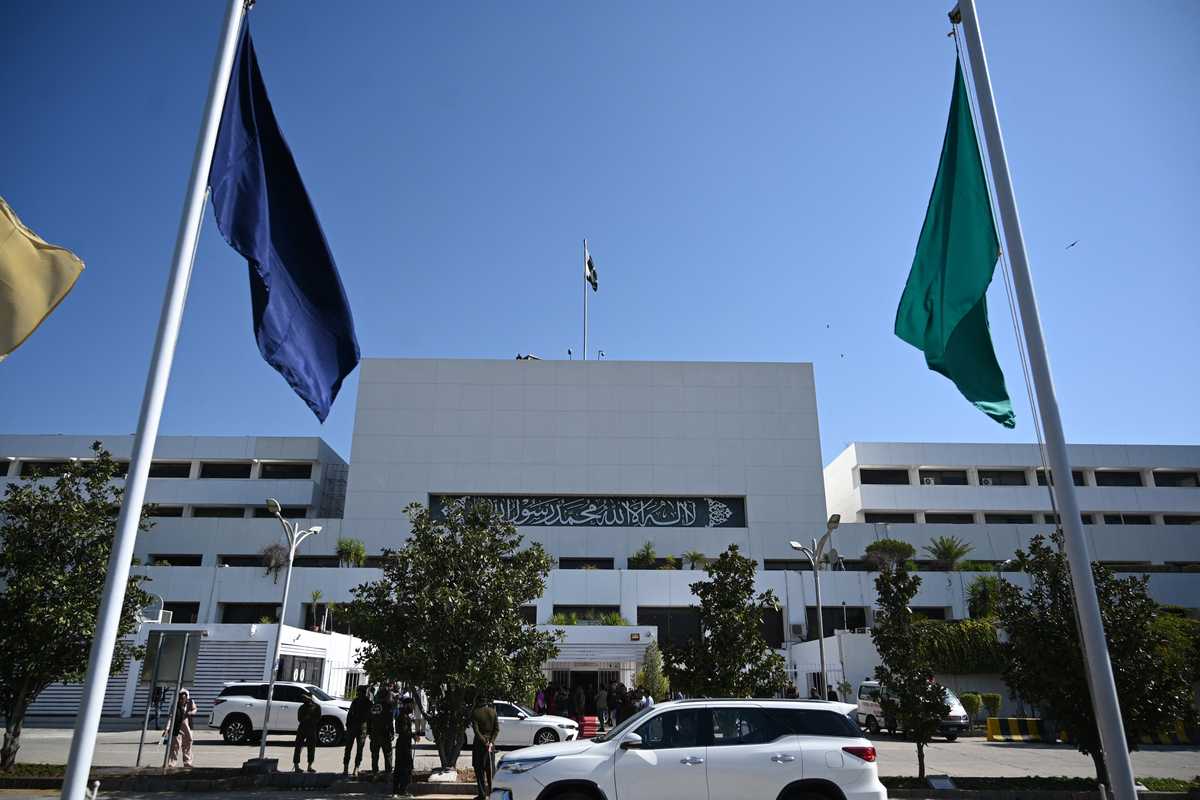Battleground of the powerful public accounts committee
The chairmanship has historically been a point of contention between ruling and opposition parties

Javed Hussain
Correspondent
I have almost 20 years of experience in print, radio, and TV media. I started my career with "Daily Jang" after which I got the opportunity to work in FM 103, Radio Pakistan, News One, Ab Tak News, Dawn News TV, Dunya News, 92 News and regional channels Rohi TV, Apna Channel and Sach TV where I worked and gained experience in different areas of all three mediums. My journey from reporting to news anchor in these organisations was excellent. Now, I am working as a correspondent with Nukta in Islamabad, where I get the opportunity of in-depth journalism and storytelling while I am now covering parliamentary affairs, politics, and technology.

A general view of the Pakistan's Parliament House during the presidential election in Islamabad on March 9, 2024.
AFP
The ruling Pakistan Muslim League-Nawaz (PML-N) has called on the opposition to nominate a chairman for the all-powerful Public Accounts Committee (PAC)
In a recent letter, available with Nukta, Chief Whip Dr Tariq Fazal Chaudhry urged Omar Ayub, opposition leader from rival Pakistan Tehreek-e-Insaf (PTI), to submit a panel of four members for the election of a PAC chairman by September 26.
Dr Chaudhry noted that although the PAC chairman traditionally comes from the opposition, it is not mandated by parliamentary rules. "We want to maintain this tradition with sincerity," he wrote, emphasizing the public's interest in filling the crucial role as soon as possible.
Why the post matters
The PAC plays a vital role in ensuring accountability for government spending in Pakistan, regularly auditing financial accounts and scrutinizing reports.
The chairman’s role is highly significant, as the committee can summon government officials, ministers, and even the prime minister to address financial irregularities.
Historically, the chairmanship has been a point of contention between ruling and opposition parties. The position grants the holder significant power to expose government mismanagement, making it a potential tool for political leverage.
Power struggle and delays
In recent months, the PAC has remained without a chairperson due to a political standoff between the coalition government and PTI. In July, reports suggested that both parties were still deadlocked over the position, which has led to delays in the committee's full activation.
The deadlock is a continuation of a broader struggle over parliamentary committee leadership. Earlier this year, a tentative agreement was reached between the government and the opposition, allocating 26 committee chairmanships to the treasury and 11 to the opposition, with the PAC slated to be led by an opposition lawmaker.
Despite this agreement, disagreements persisted, and no consensus has been reached for PAC leadership.
Initially, the PTI had nominated Sher Afzal Marwat for the post, later suggesting Sheikh Waqas Akram as a replacement. At one point, PTI founder Imran Khan proposed Sahibzada Hamid Raza of the PTI-backed Sunni Ittehad Council as a candidate. Most recently, Barrister Gohar Ali Khan, PTI's chairman following Imran Khan’s arrest, nominated Omar Ayub for the position.
In July, a report from Dawn highlighted the ongoing struggle between the ruling alliance and the opposition for control over the committee, causing further delays.
As of now, the PTI has yet to provide an official response, and the matter remains unresolved.
Historical significance
The PAC has been a key institution in Pakistan since the formation of the country’s first legislative assembly. According to historical records reviewed by Nukta, Pakistan’s first PAC was established on May 20, 1948, although it remained largely inactive for three years. Over time, the PAC has been led by various prominent figures, including five finance ministers and one former State Bank governor.
The first fully functional PAC came into existence on April 14, 1951, with then-state minister of finance Ghayasuddin Pathan as its chairman. Over the decades, the committee has undergone several changes, and its leadership has played a critical role in monitoring government expenses.
The PAC has been chaired by numerous influential leaders since its inception. For example, from 1951 onwards, finance ministers like Ghayasuddin Pathan and Muhammad Ali held the PAC chairmanship during crucial periods of Pakistan's early governance. Ad hoc chairpersons also frequently assumed leadership roles due to constitutional provisions.
The fifth PAC, constituted on July 13, 1965, appointed Noorul Amin, a former opposition leader and deputy prime minister, as chairperson. His leadership marked a notable phase in the PAC's history, with the committee playing a key role in parliamentary oversight of public finances.
One of the most active periods for the PAC came under the leadership of Chaudhry Nisar Ali Khan, the opposition leader, who took over as PAC chairman in 2008. His tenure saw a significant review of government audit reports, addressing nearly three decades of financial backlogs.
Tug-of-war over the slot
Senior parliamentary affairs journalist M.B. Soomro told Nukta that the practice of electing the PAC chairman from the opposition started in 2008, following the Charter of Democracy. Opposition leader Chaudhry Nisar Ali Khan, who also served as PAC chairman, was notably active during his tenure, finalizing many audit reports related to government expenditures.
According to the National Assembly Secretariat, the 15th PAC, chaired by Noor Alam Khan during the Pakistan Democratic Movement (PDM) government, held the highest number of meetings. Between May 23, 2022, and August 9, 2023, the PAC and its subcommittees convened a total of 618 meetings, remaining highly active throughout this period.
The current impasse mirrors similar situations in the past. After the 2018 general elections, PML-N leader Shehbaz Sharif served as PAC chair until his appointment as prime minister. His absence led the opposition to nominate Rana Tanveer Hussain, who held the position until May 2022. The Pakistan Democratic Movement (PDM) government later appointed Noor Alam Khan of PTI as PAC chairman, a role he held until August 2023.
In February 2024, Pakistan held general elections, leading to the formation of a new parliament. Despite the passage of eight months, the PAC has remained without a chairperson.
Rules of procedure and composition of PAC
According to the Rules of Procedure of the National Assembly, the PAC comprises 29 members, with the finance minister serving as an ex-officio member. Of the 29, 23 members are from the National Assembly, while six members are included from the Senate, ensuring representation from all provinces and the federal capital.
The committee must consist of three members from the government and three from the opposition. The chairman is elected through a voting process by the committee members, with the nominated candidates presented by the committee secretary. Once an agreement is reached on a name, the chosen candidate becomes the PAC chairman.
What does the PAC do?
As per Section 203 of the Rules of Procedure, the PAC is responsible for highlighting and resolving irregularities in government expenditures, which are approved by the National Assembly. The committee reviews the annual reports presented by the Auditor General of Pakistan and the finance minister.
The PAC is tasked with examining accounts where funds were allocated by the assembly for government expenditures, annual financial accounts, reports of the auditor general, and other relevant matters. During the review of the auditor general's reports, the committee must decide on the expenditures by consensus among its members. It must ensure that the funds are legally available and properly allocated.
As per the rules, the PAC must submit its final audit reports to the National Assembly within one year, and a motion for approval is to be presented for the assembly's consideration.
Deadline
With the September 26 deadline approaching, it remains to be seen whether the PTI will submit its nominations and agree on a candidate for the PAC chairman. Both the government and opposition appear locked in a power struggle that has far-reaching implications for parliamentary oversight and governance.
Should the opposition fail to nominate a candidate, it is unclear how the government will proceed. Parliamentary affairs experts have warned that any further delay could hinder the PAC’s ability to function effectively.







Comments
See what people are discussing